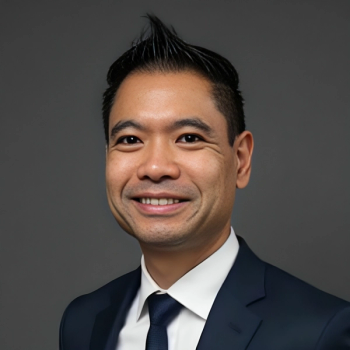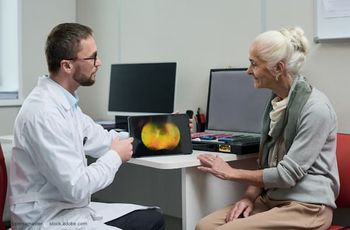
2022 in review: Orbis International CEO look back, offers 2023 outlook
Derek Hodkey, president and CEO of Orbis International, discusses key achievements for the company and its Flying Eye Hospital in 2022 and offers his outlook for 2023.
This transcript has been edited for clarity:
David Hutton: I am David Hutton of Ophthalmology Times.® I am joined today by Derek Hodkey, president and CEO of Orbis International. Thanks for joining us today. First, let’s talk about 2022 and the key developments for Orbis, including the return to in-person training.
Derek Hodkey: Yeah, so for me, Dave, 2022 has been a remarkable year. We celebrated 40 years of innovation. It was 40 years ago, 1982, we had our first flying eye hospital visit to Panama. And that spirit of innovation that started us down that pathway is continued this year. And so we're celebrating that, you know, I'm also delighted as the new CEO, I came on in September of 2020, that this year, we launched our new 5-year strategic plan. And this plan is really focused on making sure that we are doing all that we can to link eye health to the sustainable development goals as stated by the UN. And I can talk more about that later. You know, also, for me, 2022 was remarkable in that we were able to finally get back to some in person training, which was fabulous. And for us, we did three simulation trainings this year. The first one we did in Texas at the Alcon campus with residents and students, We then held a training in California in coordination with UC Davis and Moffett Field for residents from Bolivia, Chile and Peru. And then, about probably a month ago now, at the end of October and beginning of November, we did a training I'm particularly proud of where we went to Doha, in Qatar, and we did a training for women, ophthalmologist and nurses from conflict zones. I see more opportunity for us as we go ahead. And then finally, as I've sat back and I expressed to my board when I saw the accomplishments for this year, our telemedicine platform that I'm sure you're familiar with Cybersight has grown tremendously. Before the pandemic, we had about 15,000 registered users across the globe. Today, we are over 76,000 registered users, with users in every country on earth except North Korea and Western Sahara. And that really gives us an opportunity to have those points of outreach and to continue that training that Orbis is known for.
David Hutton: Tell us a little bit about what you have in store for 2023.
Derek Hodkey: In 2023, I'm delighted to say that we are returning to in person programming. We did go this year and November of 2022, to Ethiopia, to do an in person hospital based training for pediatrics in business. For 2023. In May, we are planning to be in Vietnam with the Flying Eye Hospital for an in person and hospital based training. And then in September, we'll be in Zambia for a training aboard the Flying Eye Hospital coordinated with local hospitals.
David Hutton: So now can we say that the flying Eye Hospital is back to pre-pandemic operations?
Derek Hodkey: Well, I think it's I think it's more accurate to say I think we're a better operation. Let me explain what I mean. So, as you know, we've learned a lot from the pandemic as everybody did. And for us, what we did is we pivoted during the pandemic. And we didn't just sit there grounded because our plane was grounded. We thought about new ways to make sure that the whole generation of ophthalmologists and nurses and anesthesiologists weren't going to be left behind in that period of the pandemic. So we adopted a virtual training model. And that virtual model really mimicked a lot of what we do on the plane in terms of making sure we're training and engaging with nurses and anesthesiologist and ophthalmologists, of course, and biomedical engineers and delivering training through live webinars and so forth. So, for us ,that now has been built into programming as we go forward. What we do is we have a model which we call blended learning, it's really taking the best of what we learned during the pandemic. So that before we go to a country office to do a program, we do online training first. And then after we leave, we continue that online training to reinforce the use of the digital assets that Orbitz has not only built, but also the ones that we've seen, have generated tremendous value.
David Hutton: Are there any other ways the pandemic has changed the way things are done aboard the flying Eye Hospital?
Derek Hodkey: Yeah, it's a good question, Dave. Certainly, you know, as when you were I go to our normal physician, we still have people have to mask when they come on the plane. When we do a training. We also do daily COVID testing while we're doing a training on the plane to keep everybody as safe as possible. We've also instituted COVID protocols in case we do have somebody who does test positive so that we can make sure that we're keeping everybody informed. We've, of course built in the appropriate redundancies. You know, I think also for us what's been good is, we've been able to learn not only through the remote learning aspects that I was talking about a moment ago with our blended learning, but we've also changed how we've done some of our program delivery. For example, in Ethiopia, where you're quite familiar with where Orbis has done mass drug administration for the treatment of trachoma for a number of years, that typically involves bringing a whole community together in a large group setting in order to distribute drugs. Well, under COVID, that's just not practical, nor is it safe. So what we did is we adopted door to door testing, where we basically would go and measure individuals to find out how much drug they would need based on their height, make sure that we were able to test that, you know, get drugs to the whole household. And we follow that same model in India, where we were normally doing screening in schools for children, where we've screened millions of children. And, you know, the number of years we've been in India, we again, went to a door to door model to be able to screen children for vision. And the beauty here, Dave, is that we were also then able to test the whole household. So you know, a mother or a father and grandparents who's also in that house, we can also check their vision as well. So I think in that respect, we have, you know, again, I think we've looked for the better as we try to look at the lessons learned from the pandemic.
And then organizationally, it allows us as an executive team here to think about, what's the work model for Orbis going forward. We're headquartered in New York City. What we have done is we move to a model where we allow our staff to work anywhere in the world where they're going to be the most productive in collaboration and consultation with their manager. If you are more productive in the office, great, we have office space for you. If you're going to be in the office three days a week, you get a dedicated space. Anything less than that we hotel. But you know, I think the benefit thing from you know, from an organizational management point of view is we're hiring the best people in the world wherever they are. So my head of Global Programs, who I brought on when I came on board, is based in South Africa. Normally, that position would be based in New York, but you know, we're getting the benefits of, again, lessons learned during the pandemic.
David Hutton: And ultimately, as you go through 2023, how will you measure success of the upcoming flights and training?
Derek Hodkey: Yeah, that's a great question, David. You know, when I talked a little bit ago about our new strategic plan, at the core of that we have five programmatic priorities that are guiding us, pediatric eye care, trachoma elimination, strengthening community-based primary care, growing eye health capacity, and then focus on women, young girls, persons with disabilities and displaced persons. And so looking at those five programming priorities, which has allowed our country teams now to create their own country level plans, we're then looking at the next step in terms of the outcome indicators and the things we want to be able to track to show that because ultimately, what we want to talk about is value for money and evidence to show it.
David Hutton: And shifting gears, what are some of the trends? We're seeing philanthropic giving in eye care?
Derek Hodkey: I think a lot of us were quite both surprised and delighted to see the generous gift from MacKenzie Scott, who donated $15 million through the nonprofit organization Vision Spring. And, you know, I'm hoping that that inspires other giving. As we look at the impacts of eye health, you know, Orbis has partnered closely with a number of foundations and organizations. And for me, it's often helping people understand the connectivity of eye health to everyday life. And that's why for me, particularly, it was so important, and our new global strategic plan to link eye health, to the sustainable development goals. So it's not just eye health, for eye health, it's eye health as it relates to job creation. It's as it relates to the ability to stay in schools, the ability to come off of social welfare, the ability to have personal independence. All of those things are going to help us create more value. And those are the impacts that not only funders want to see, but we as an organization want to see, to make sure that we are delivering the best possible care and hoping to ensure the best possible quality of life for all those we engage with.
David Hutton: And lastly, what's your outlook for the coming year?
Derek Hodkey: 2023 is going to be an exciting year. I think that, you know, like many organizations, we hope that COVID would be well in the rearview mirror. It's not quite there yet. You know, as we look at where we are, and you know we're hoping to do more and get more engaged in Asia, but we're being cautious with what's expected what's happening in in COVID. But I'm really excited today because with our new strategic plan, which will be going into year two on, we now have regional program strategies, we have a new cyber strategy coming out at the beginning of next year, we have a new head of development joining us in January who is going to lead our fundraising teams. And you know, between all of that, and I think the energy that the team is feeling, again about the work that we do, and getting to have those opportunities for more direct engagement. You know, everything that we have done with respect to being able to deliver service and training during the pandemic, in a virtual way, is an important part of who we are going forward. But there's no replacing that personal connection as well, and those personal training elements. And so, I think as we look at 2023, we hope that we'll start to see more and more of those down the road and continue to hopefully encourage more donors to once again look at the benefits of what eye health and vision prevention and vision care means for so many around the world. Because, as you know, Dave, you know, the 8 billion people on the planet right now, you know, 1.1 billion are living with avoidable vision loss 90% of which is preventable. So, you know, there is tremendous value for money out there. There was a study that showed for every $1 invested in eye health, there's a $4 return on investment. So the arguments are there. We just need to get the get the good programming done, get the evidence out there and get people on board.
David Hutton: Excellent. Again, thank you so much for joining us today. We really appreciate your time.
Newsletter
Keep your retina practice on the forefront—subscribe for expert analysis and emerging trends in retinal disease management.

































